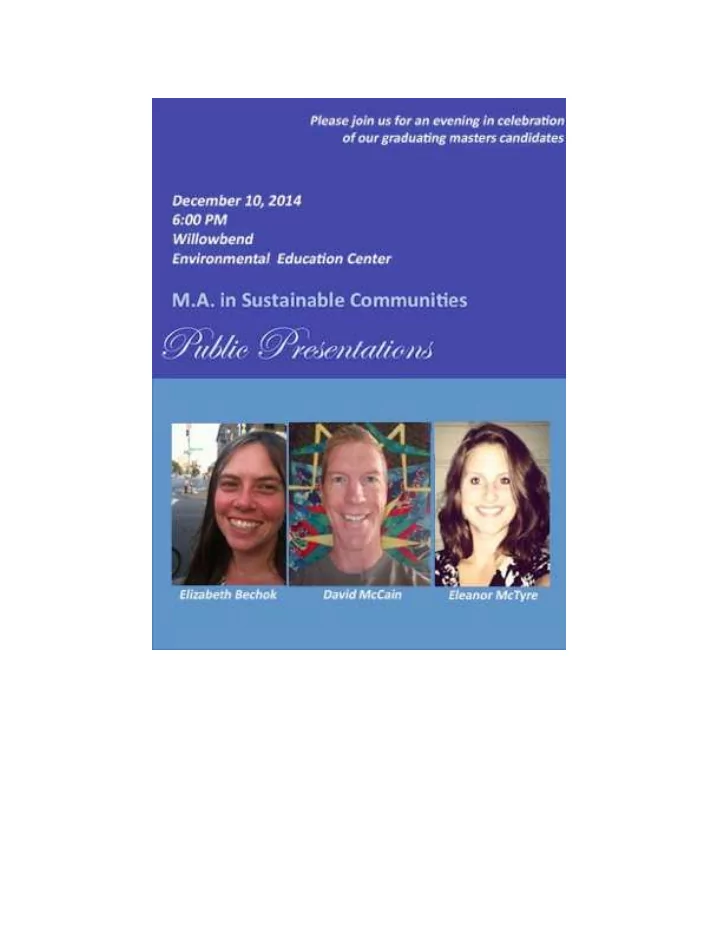

The presentations this evening are as follows: Elizabeth Bechok GROWING FOOD WITH SUSTAINABLE SOURCES OF WATER: CONVERSIONS TO ARID LAND AGROECOSYSTEMS BY ARIZONAN FARMERS Thesis Abstract: Farmers in Arizona use significant amounts of groundwater for commercial agriculture. Small and mid-scale diversified farms still rely on these unsustainable water sources even though they attempt to create sustainable farming systems in arid lands. This paper explores how small and mid-scale farmers in Arizona convert their farming practices to conserve and use more sustainable sources of water. To answer this question, I interviewed nine Arizonan farmers who grow diversified vegetables on 15 acres or less using primarily groundwater from wells. I asked these farmers if they made any conversions involving water management techniques on their land and if those conversions reduced overall water use. I then designate which level of conversion these on-farm changes represent according to the four levels of conversion to an agroecosystem defined by Gliessman (2013). Analyzing these conversions of water management practices on farms, I identify innovative ways that these farmers attempt to move away from the use of groundwater and instead use rainwater catchment either in cisterns or in the soil. ~ Special thanks to committee members: Carol Thompson, Chair Gary Nabhan, University of Arizona Miguel Vasquez, Anthropology ================================================== David R. McCain STEPPING BACK TO MOVE FORWARD: HOW THE SKILLS OF EMPATHIC DIALOGUE SUPPORT INTERPERSONAL COMMUNICATION Thesis Abstract: Interpersonal communication is essential for relationship-building. Strong interpersonal relationships undergird communities by facilitating their formation and supporting their maintenance and growth. This study explores the effect of training in Empathic Dialogue, a system of communication based on Nonviolent Communication, on the interpersonal communication skills of nine participants. I address two theoretical frameworks. First, in order to argue that Nonviolent Communication constitutes a virtue, I outline Aristotle’s definition of virtue and the process by which one develops them. Then, I introduce the theory of McDonaldization and apply it to interpersonal communication. Finally, I review Nonviolent Communication based on the dimensions of McDonaldization, the results of which support my contention that Nonviolent Communication opposes McDonaldization.
I present my finding that Empathic Dialogue had a positive impact on the research participants’ communication skills. I then address these findings through the lens of Aristotle’s virtues and McDonaldization and consider wider implications of these findings on the development of sustainable communities. ~Special thanks to committee members: Julie Piering, Ph.D., Chair, Philosophy Janine Schipper, Ph.D., Sociology and Social Work Stan Clark, Ed.D., Employee Assistance and Wellness office ================================================== Eleanor McTyre PEDAGOGY FOR WATER ETHICS IN VIRTUAL LEARNING ENVIRONMENTS Thesis Abstract: This thesis concerns pedagogy for water ethics in virtual competency-based learning environments. Bringing curricula for water ethics into the classroom is crucial as consumption, pollution, and climate change affect freshwater supplies and how water is used in human groups. The term “water ethics” is based largely on extending Aldo Leopold’s renowned ““Land Ethic””, sourced from A Sand County Almanac, to the ecology of water. This idea is also based on paradigm shifts. Specifically, this thesis focuses on issues associated with human water use and emphasizes how water’s economic value trumps its ecological and social value in the Global North. Ways of incorporating curricula that address the key social and cultural issues associated with human water use in the Global North are explored in this thesis to determine best practices for teaching students how to think critically about water and for teaching students how to develop a water ethic. Because the Global North controls the majority of the world’s wealth and resources, educating citizens of this community may be the most impactful way to shift water paradigms. A shift from the economy of water to the ecology of water through a water ethic is the ultimate goal of this research by applying a 2-credit hour (equivalent) online curriculum that will be offered to the Personalized Learning program at Northern Arizona University. ~Special thanks to committee members: Bruce Fox, Ph.D., Chair, School of Forestry Corrine Gordon, Ph. D., Personalized Learning Janine Schipper, Ph.D., Sociology and Social Work Abraham Springer, Ph.D., School of Earth Science & Environmental Sustainability
Recommend
More recommend